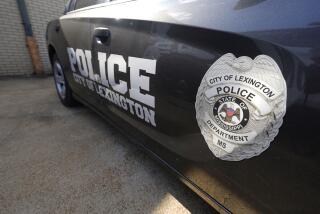Study Says Police More Likely to Stop Minorities
HOUSTON — African American and Latino drivers throughout Texas are more likely than whites to be pulled over and searched by police, according to a study released Tuesday.
Commissioned by four minority advocacy groups, the study used data provided by 413 Texas law-enforcement agencies and examined millions of “encounters” between police officers and drivers in 2002.
The study found that three out of every four law enforcement agencies pulled over blacks and Latinos at higher rates than whites. Once the cars were pulled over, six in seven agencies reported searching African Americans and Latinos at a higher rate. Statewide, African Americans were about 60% more likely to be searched than whites, and Latinos were 40% more likely to be searched.
The numbers, the report said, “suggest a pattern of racial profiling by law-enforcement officers across Texas” -- although it cautioned that other factors in law enforcement could be responsible.
Minority leaders on Tuesday called for an inquiry to determine how much of the disparity was due to trends in crime, and how much was due to bias.
But Charley Wilkison, political and legislative director of the 15,000-member Combined Law Enforcement Assns. of Texas, questioned the study’s conclusions and accused the advocacy groups of having an interest in its results. “My experience is, if you look at a set of numbers and you look hard enough, you’ll find what you’re looking for,” he said.
The study -- conducted by the Steward Research Group and headed by a professor at the University of Texas at Austin -- was commissioned by the American Civil Liberties Union of Texas, the League of United Latin American Citizens, the Texas State Conference of NAACP Branches and the Texas Criminal Justice Reform Commission.
Its findings are just the latest to show that people of color are pulled over and searched more often than whites. In Missouri, for example, state officials determined in 2002 that African Americans were stopped at a rate far higher than their population alone should suggest.
Several members of Congress, in fact, are planning to submit a bill later this month that would require police agencies to record the race of drivers they pull over -- or face losing federal funding.
Minority leaders and civil-rights advocates said Tuesday that while they were not surprised by the Texas study’s findings, they viewed them as a launch pad for reform.
In recent years, blacks and Latinos have brought charges of police brutality and abuse with some regularity in Texas.
A 1999 drug sting in the town of Tulia, for instance, resulted in the arrests of 46 people, almost all of them African American. The charges were based on the work of a single informant, who once had been named Texas lawman of the year. The informant since has been charged with perjury in the case, and Gov. Rick Perry last year pardoned most of those convicted in the case.
In December, a man in Chambers County, east of Houston, accepted a $120,000 settlement to end a civil rights lawsuit alleging that sheriff’s deputies had harassed and used excessive force against residents of minority communities.
And last month, scores of people gathered on the steps of the state Capitol in Austin to protest the shootings of two unarmed black men by local police.
The Texas study found that the racial disparity in the treatment of drivers was particularly pronounced in metropolitan areas. In Houston, for instance, blacks were more than three times as likely as whites to be searched. Robert Hurst, a spokesman for the Houston Police Department, said he had not yet seen the report and could not comment.
He did point out that in 1999, the city had voluntarily implemented a program in which officers recorded the race and ethnicity of people with whom they came into contact.
According to the study, African American and Latino drivers also were more likely to be pulled over in areas of the state where whites more often were found with drugs and weapons.
Will Harrell, executive director of the ACLU of Texas, noted that in some areas, the study found that less than 10% of Latino drivers who consented to searches of their cars were found to be “doing something wrong.”
“That means that 90% of them suffered the humiliation and demoralization that searches entail, but were innocent,” Harrell said. “From another perspective, that means 90% of the time, police are wasting their time. It is inefficient.”
But Wilkison, who also had yet to see the study, said the few officers who abuse their power by improperly targeting people of color are anomalies.
“Are there issues and problems out there? Sure,” he said. “Officers are taught -- they are trained -- to profile. But it is unfair and unjust to paint them with a broad brush, [to say] that they are racist or act in a discriminatory way.”
More to Read
Sign up for Essential California
The most important California stories and recommendations in your inbox every morning.
You may occasionally receive promotional content from the Los Angeles Times.











